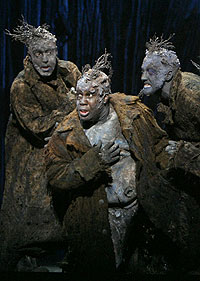 I saw Grendel, Transcendence of the Great Big Bad last Saturday at the Lincoln Center Festival 2006, and I must say that Elliot Goldenthal's music left very little of an impression on me. Also, can anybody tell me what "Transcendence of the Great Big Bad" means? The only "Big Bad" that I know is Little Red-Riding Hood's wolf, and there is nothing great about him. Last I check, Grendel was not a wolf, but rather a monster, and a rather nasty one too. He is, of course, one of the featured players in Beowulf, one of English literature's most maligned works. At one point or another every English-speaking student has to read some part of the epic, and most people detest the experience. Woody Allen in his film Annie Hall advises Diane Keaton's character, who is thinking of taking an English Lit adult education course at NYU, not to take anything where they make you read Beowulf.
I saw Grendel, Transcendence of the Great Big Bad last Saturday at the Lincoln Center Festival 2006, and I must say that Elliot Goldenthal's music left very little of an impression on me. Also, can anybody tell me what "Transcendence of the Great Big Bad" means? The only "Big Bad" that I know is Little Red-Riding Hood's wolf, and there is nothing great about him. Last I check, Grendel was not a wolf, but rather a monster, and a rather nasty one too. He is, of course, one of the featured players in Beowulf, one of English literature's most maligned works. At one point or another every English-speaking student has to read some part of the epic, and most people detest the experience. Woody Allen in his film Annie Hall advises Diane Keaton's character, who is thinking of taking an English Lit adult education course at NYU, not to take anything where they make you read Beowulf.This opera is based less on the epic (although portions of the work are sung in Old English) and more on John Gardner's book of the same name, where the story is told from the monster's point of view. Although this was considered terribly original when the book was published, most American critics were ignorant of the fact that this kind of approach had already been done, many years earlier, by author Jorge Luis Borges in his great short story "The House of Asterión." In this brilliant work, the Argentinean writer retells the story of the Minotaur, approaching it from the point of view of the half-man, half-bull creature that lives in the labyrinth of Crete.
What I did find totally fascinating and fun was Julie Taymor's staging of this work. What an incredible visionary talent she is! Using her trademark puppets and marionettes, she creates a make-believe world that is both remote and familiar. The most memorable part, from the point of view of staging, is the dragon scene. You could feel what every Wagner fan in the house was thinking: A Taymor Ring! She would be the perfect person to stage a Ring that people will actually like, and try to understand, but that is perhaps the topic of another post.
Commanding the stage for the entire evening (he's in almost every scene) was bass-baritone Eric Owens in the title role, who earned a well-deserved standing ovation. He was an excellent monster with a booming voice to match. Denyse Graves also got a big hand for her sultry role as a sexy Dragon. Too bad that Goldenthal was not able to write music for her that truly soared. Only towards the end of her single scene, did the vocal straight-jacket come off, and she was able to sing some rather exciting music above the staff. The fact that this dragon has a tail which ends in a backup trio of "dragonettes" made the scene a popular favorite, but not only did they have very little singing to do, this device was used in another opera, namely John Adams' 1987 work Nixon in China, where Chairman Mao's lines are echoed by a trio of secretaries that follow him around.
Though the lack of originality is clearly evident, I'm glad that I had a chance to see this work. For one thing, I got to see Ms. Taymor at her visually best, and it's a once in a lifetime chance to experience it. I simply don't think that in its current state this opera will see the light of day anytime soon.
Oh yeah -- the wall was great! This massive set, that had caused the work to be postponed in its world premiere, worked without a hitch on Saturday and, as I understand it, throughout the run at Lincoln Center. It was a great thing to behold. Bravo Taymor!
No comments:
Post a Comment